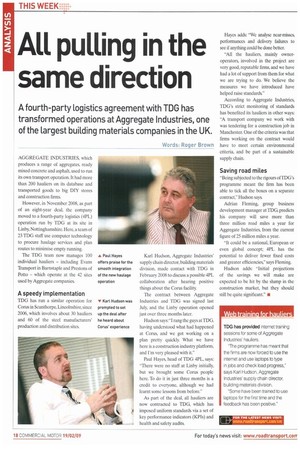ALL pulling in the same direction
Page 18

If you've noticed an error in this article please click here to report it so we can fix it.
A fourth-party logistics agreement with TDG has transformed operations at Aggregate Industries, one of the largest building materials companies in the UK.
Words: Roger Brown AGGREGATE INDUSTRIES, which produces a range of aggregates, ready mixed concrete and asphalt, used to run its own transport operation. It had more than 200 hauliers on its database and transported goods to big DIY stores and construction firms.
However, in November 2008, as part of an eight-year deal, the company moved to a fourth-party logistics (4PL) operation run by TDG at its site in Linby, Nottinghamshire. Here, a team of 23 TDG staff use computer technology to procure haulage services and plan routes to minintise empty running.
The TDG team now manages 100 individual hauliers — including Evans Transport in Barnstaple and Prestons of Polio — which operate at the 42 sites used by Aggregate companies,
A speedy implementation
TDG has run a similar operation for Corus in Scunthorpe. Lincolnshire, since 2006, which involves about 30 hauliers and 60 of the steel manufacturers' production and distribution sites. Karl Hudson, Aggregate Industries' supply chain director, building materials division, made contact with TDG in February 2008 to discuss a possible 4PL collaboration after hearing positive things about the Corus facility.
The contract between Aggregate Industries and TDG was signed last July, and the Linby operation opened just over three months later.
Hudson says:"I rang the guys at TDG. having understood what had happened at Corus, and we got working on a plan pretty quickly. What we have here is a construction industry platform, and I'm very pleased with it."
Paul Hayes, head of TDG 4PL, says: "There were no staff at Linby initially, but we brought some Corus people here. To do it in just three months is a credit to everyone, although we had learnt some lessons from before."
As part of the deal, all hauliers are now contracted to TDG, which has imposed uniform standards via a set of key performance indicators (KPIs) and health and safety audits. Hayes adds: "We analyse near-misses, performances and delivery failures to see if anything could be done better.
'All the hauliers. mainly owneroperators, involved in the project are very good, reputable firms, and we have had a lot of support from them for what we are trying to do. We believe the measures we have introduced have helped raise standards."
According to Aggregate Industries, TDG's strict monitoring of standards has benefited its hauliers in other ways: "A transport company we work with was tendering for a construction job in Manchester. One of the criteria was that firms working on the contract would have to meet certain environmental criteria, and be part of a sustainable supply chain.
Saving road miles
"Being subjected to the rigours of TDG's programme meant the firm has been able to tick all the boxes on a separate contract." Hudson says.
Adrian Fleming, group business development manager at TDG, predicts his company will save more than three million road miles a year for Aggregate Industries, from the current figure of 25 million miles a year.
"It could be a national, European or even global concept; 4PL has the potential to deliver fewer fixed costs and greater efficiencies," says Fleming.
Hudson adds: "Initial projections of the savings we will make are expected to be hit by the slump in the construction market, but they should still be quite significant." •
















































































































































